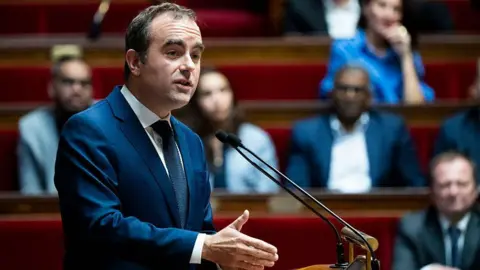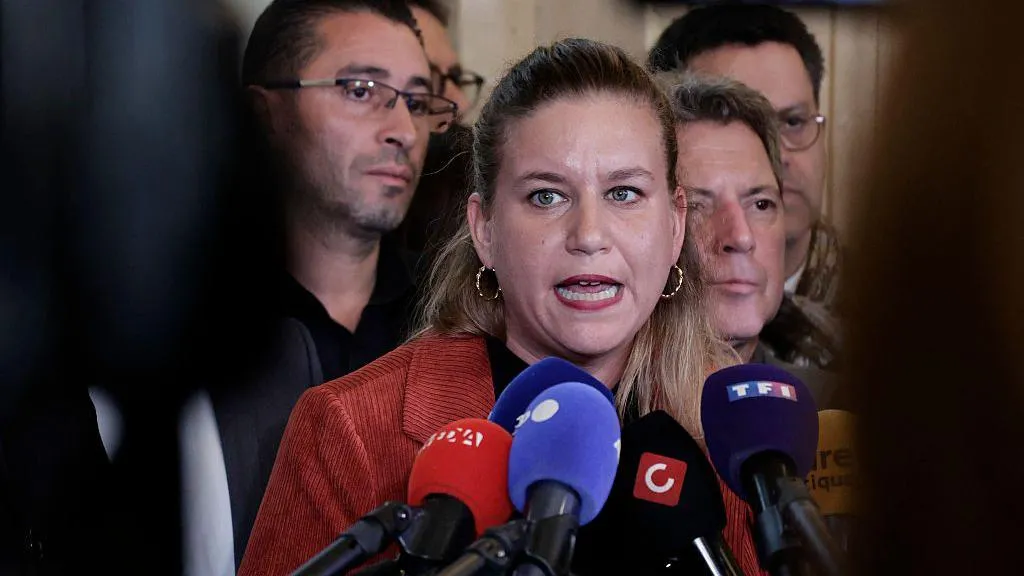Hugh SchofieldIn Paris
 AFP via Getty Images
AFP via Getty ImagesFrance’s new prime minister, Sébastien Lecornu, has bought himself breathing space after winning two no-confidence motions tabled by the opposition.
In the tightest vote, a motion sponsored by the far left fell 18 votes short of the 289 needed to bring him down.
It means that after just five days in office, Lecornu has survived a first major ordeal in parliament and can now focus on the task of passing the 2026 budget.
Any relief for the prime minister is likely to be short-lived, with the far left and far right still gunning to bring him down. And the Socialists, who threw a lifeline in the no-confidence motions, have made clear they will not be so indulgent next time round.
Also, any tactical victory enabling the government to endure for now is more than offset by the huge damage to France’s reputation caused by weeks of confusion and capitulation.
Appointed by President Emmanuel Macron four weeks ago, then re-appointed in chaotic scenes on Friday after he resigned on Monday, Lecornu only survives thanks to major concessions made to the left.
To buy the support of the Socialist Party, which has 65 or so MPs, the prime minister promised to freeze Macron’s most important economic reform of his second term – the raising of the retirement age to 64.
But he also made another, possibly more important, gift to the opposition, which has big implications for the chances of obtaining a budget in time for the end-of-year deadline.
By pledging not to resort to the constitutional device known as the 49:3 – which lets governments force through laws without a vote – Lecornu handed ultimate control over the budget to the parties in parliament.
It is a huge shift in power, reflecting the decline of presidential authority since Macron’s botched parliamentary dissolution of July 2024. For many observers it heralds a return, for good or ill, to the party politicking that was a hallmark of the pre-1958 Fourth Republic.
By assuring MPs that they and not the government would have the last word on the future budget, Lecornu managed to convince the Socialists that he was serious about marking a real “rupture” from previous Macronite administrations.
But he may also have surrendered any prospect of the kind of belt-tightening debt reduction that the money markets and the European Union are demanding.
The draft budget tabled by Lecornu on Tuesday aims to reduce the deficit to 4.7% of economic output (GDP) by making savings of €30bn (£26bn), with a squeeze on spending in the health sector and local administration.
But the Socialists have joined the rest of the left and the far-right in denouncing the text as a betrayal of the less well-off.
Party leader Olivier Faure said that he would have no compunction about supporting a new vote of censure, if offending parts of the budget are not removed.
 AFP via Getty Images
AFP via Getty ImagesFrance’s National Assembly has been split three ways for the last 15 months, with a centre-right bloc of under 200 MPs facing a left-wing alliance of about the same size and a far-right bloc of about 140, plus some independents.
None of the three prime ministers since then has been able to find a reliable majority.
Weeks of bickering in Paris have triggered warnings about the public’s growing disillusionment with politics – the spectacle appearing to confirm the notion that the prime aim of most politicians is simply to stay in power.
President Macron, who is blamed for the crisis by most French voters, has seen his popularity ratings slump to just 14%. He has been in office for eight years, and the far right and far left have called for his resignation before his second term ends in 18 months.
According to his one-time adviser, the veteran essayist and confidant of presidents Alain Minc, Macron “must now go down as the worst president of the Fifth Republic”.
Minc said Macron had come to office promising to act as a bulwark against the far right but he had left National Rally at the gates of power.
“If you look around us,” said Minc, “the Germans are petrified about what a French collapse will do to the economy. The British are petrified about the strategic implications. The Italians are laughing at us, because we always laughed at them.”
“In America, President Trump is saying that smooth-talker Macron has got what he deserves. Only in Russia are they smiling.”




